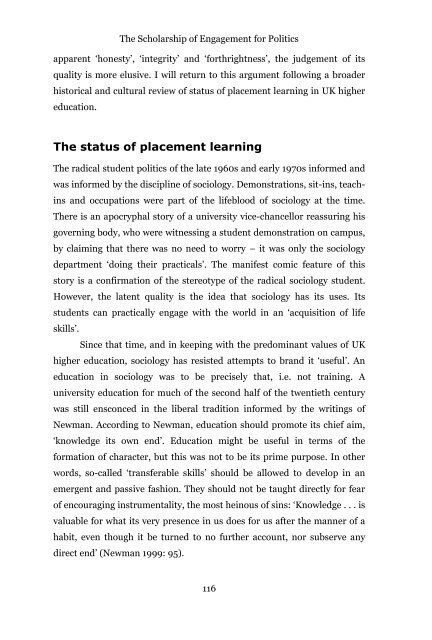The Scholarship of Engagement for Politics: - Higher Education ...
The Scholarship of Engagement for Politics: - Higher Education ...
The Scholarship of Engagement for Politics: - Higher Education ...
Create successful ePaper yourself
Turn your PDF publications into a flip-book with our unique Google optimized e-Paper software.
<strong>The</strong> <strong>Scholarship</strong> <strong>of</strong> <strong>Engagement</strong> <strong>for</strong> <strong>Politics</strong><br />
apparent ‘honesty’, ‘integrity’ and ‘<strong>for</strong>thrightness’, the judgement <strong>of</strong> its<br />
quality is more elusive. I will return to this argument following a broader<br />
historical and cultural review <strong>of</strong> status <strong>of</strong> placement learning in UK higher<br />
education.<br />
<strong>The</strong> status <strong>of</strong> placement learning<br />
<strong>The</strong> radical student politics <strong>of</strong> the late 1960s and early 1970s in<strong>for</strong>med and<br />
was in<strong>for</strong>med by the discipline <strong>of</strong> sociology. Demonstrations, sit-ins, teachins<br />
and occupations were part <strong>of</strong> the lifeblood <strong>of</strong> sociology at the time.<br />
<strong>The</strong>re is an apocryphal story <strong>of</strong> a university vice-chancellor reassuring his<br />
governing body, who were witnessing a student demonstration on campus,<br />
by claiming that there was no need to worry – it was only the sociology<br />
department ‘doing their practicals’. <strong>The</strong> manifest comic feature <strong>of</strong> this<br />
story is a confirmation <strong>of</strong> the stereotype <strong>of</strong> the radical sociology student.<br />
However, the latent quality is the idea that sociology has its uses. Its<br />
students can practically engage with the world in an ‘acquisition <strong>of</strong> life<br />
skills’.<br />
Since that time, and in keeping with the predominant values <strong>of</strong> UK<br />
higher education, sociology has resisted attempts to brand it ‘useful’. An<br />
education in sociology was to be precisely that, i.e. not training. A<br />
university education <strong>for</strong> much <strong>of</strong> the second half <strong>of</strong> the twentieth century<br />
was still ensconced in the liberal tradition in<strong>for</strong>med by the writings <strong>of</strong><br />
Newman. According to Newman, education should promote its chief aim,<br />
‘knowledge its own end’. <strong>Education</strong> might be useful in terms <strong>of</strong> the<br />
<strong>for</strong>mation <strong>of</strong> character, but this was not to be its prime purpose. In other<br />
words, so-called ‘transferable skills’ should be allowed to develop in an<br />
emergent and passive fashion. <strong>The</strong>y should not be taught directly <strong>for</strong> fear<br />
<strong>of</strong> encouraging instrumentality, the most heinous <strong>of</strong> sins: ‘Knowledge . . . is<br />
valuable <strong>for</strong> what its very presence in us does <strong>for</strong> us after the manner <strong>of</strong> a<br />
habit, even though it be turned to no further account, nor subserve any<br />
direct end’ (Newman 1999: 95).<br />
116
















